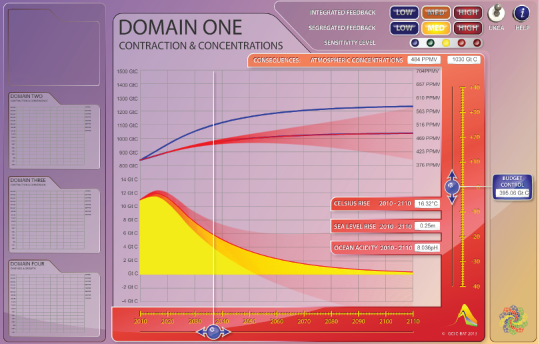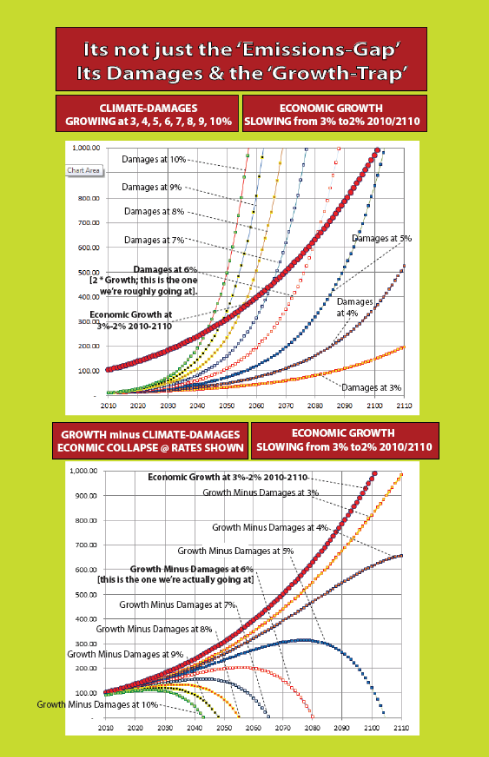Info point 6c: - GAMING THE 'ZERO SUM GAME' [AVOIDANCE]
|

BACK TO CBAT Graphic User Interface [GUI]

BACK TO ALL INFO POINTS DOMAIN 1
~~~~~~~~~~~~~~~~~~~~~~~~~~~~~~~~~~~~~~~~~
UNFCCC resorts to AVOIDANCE using the 'ZERO SUM GAME' criticism of C&C
~~~~~~~~~~~~~~~~~~~~~~~~~~~~~~~~~~~~~~~~~
Here is a paper from DRC Chinese Government entitled: -
"From burden-sharing to opportunity-sharing: unlocking the deadlock of climate change negotiation," which says this: -
ZERO SUM GAME
"The scarcity on budget for global carbon emissions raises serious conflicts about how to share the budget between Annex 1 and Non-Annex 1 countries. Given the global emission budget, increases in one country’s emissions can only be achieved at the expense of emissions from other countries (i.e. a zero-sum game).
Developed countries, with 20% of global population, have already completed the industrialization phase through a period of high fossil fuel and resources consumptions. For the remaining 80% of global population, going through the industrialization phase in the same way as the developed countries will certainly generate GHG well exceeding this budget."
ZERO SUM GAME This is exactly the phrase used recently by Christiana Figueres
[dutifully reported by Fiona Harvey in the Guardian] : -
She said there were also strong practical reasons for not basing the negotiations on allocations of future emissions to nations.
"It treats carbon budgets as though it is a zero sum game, and would presume that there is no advance in technology [to reduce emissions]. We have made tremendous advances in the past ten years."
~~~~~~~~~~~~~~~~~~~~~~~~~~~~~~~~~~~~~~~~~
Who does she think she's talking to?
This remark is virtually inumerate. It mistakenly substitutes the absolute requirement for 'emissions-contraction' with the 'won't-it-be-nice-if' potential of 'technology-conversion'.
These are two adjacent issues and we can hardly substitute one for the other, if UNFCCC-compliance is why we are doing this.
However, making it so publicly is hardly an 'accident'. In reality, it indicates the increasingly desperate PR for avoidance of the contraction:concentration limits that meet the objective of the UNFCCC. It invites us all to step further into the quicksands of the collective self-deception that free-markets for clean-technology alone will chart and achieve UNFCCC-compliance.
Nobody, but nobody, is presuming that, "there is no advance in technology to reduce emissions" [etc] . . . on the contrary, what cool-headed and sensible people are asking is this: -
"Can this be developed and deployed through 'the markets alone' fast enough to achieve enough, soon enough for UNFCCC compliance below 2 degrees?"
The answer is NO, but this is clearly NOT what the DRC/Chinese Government paper is saying [and what Christiana is now converting to the 'new Voodoo Economics' of climate change].
What they are now claiming is expressed in these DRC 'conclusions' of pure 'wish-fulfillment': -
"Ultimately, a relatively lower starting point with higher temperature will achieve the well acclaimed 2°C or below target" [If only . . . . ]
"The second is to provide a practical policy initiative - a new two-track approach to facilitate this strategic transformation.
Starting from a less ambitious but legally binding UNFCCC emission target, plus a voluntary Green Growth Club approach, we have made a case that this new two-track approach could face far less resistance from individual countries in international negotiations and could establish a mechanism of triggering green growth.
This could in turn encourage individual countries to take decisive early actions to mitigate. With sufficient local benefits emerging – and the theoretical research and amounting evidences have shown so, more and more counties will then voluntarily join the Green Growth Club.
Ultimately, a relatively lower starting point with higher temperature will achieve the well acclaimed 2°C or below target."
~~~~~~~~~~~~~~~~~~~~~~~~~~~~~~~~~~~~~~~~~
GCI wrote to the author of the DRC paper as follows: -
Dear Yongsheng Zhang
Thank you so much for sending your paper: - "From burden-sharing to opportunity-sharing: unlocking the deadlock of climate change negotiation" . . . . which I am already reading with interest.
As you know, I share [indeed many now share ] your stated desire to break the deadlock at the UNFCCC negotiations. This is something that must be achieved.
As before, I understand therefore your intention in wanting to switch the debate from 'burden-sharing' to 'opportunity' as it appears to get past an obstacle.
There remains the danger however, of seeing these as 'alternatives' to each other, when clearly both these [and more] are required for UNFCCC-compliance.
So I encourage you to see that CBAT structures this 'sequentially' in four integrated 'Domains' as shown in the mock-up below and here
It is 'cognitive' and 'numerate'. For UNFCCC-compliance it is important to know closely by weight where these tonnes of carbon are going, tonne-by-tonne.
. . . are working now as user-interactive animations for that purpose.
See here a guide to all rates of convergence are possible [and shown] in Domain Two, as you have correctly argued.
-
Domain Three [contraction and conversion - or opportunities for Green Growth] complements this and is where the 'benefits' lie, but . . .
-
Domain Four [damages and growth] ultimately governs all of this and iIn 'economic language' is where the 'costs' are.
The ultimate test we all face is 'can we do enough, soon enough' to avoid runaway conditions and achieve UNFCCC compliance. The potential for rates of damage-costs to overwhelm opportunity and the benefits of 'green-growth' rises with concentrations etc.
In the light of that, it makes sense to see these Domains as integrated.
They are not 'alternatives'. If they are, the danger is remaining hostage to guesswork and false hope.
With best regards
Aubrey
~~~~~~~~~~~~~~~~~~~~~~~~~~~~~~~~~~~~~~~~~
To those who say that carbon-budgeting in a CBAT numerate way is unacceptable
"as its a ZERO SUM GAME - a C&C based carbon-budget is a ZERO SUM GAME [!] - don't you get that? . . . "
[NB Christiana Figueres' tears [Apparently 'in tears' she told the BBC that the lack of an agreement was: - "condemning future generations before they are even born . . . [this is] completely unfair and immoral"].
The answer again is: -
"Yes of course, precisely! A zero-sum budget that is absolute zero by the given end-date has a chance of being 100% effective for envisioning UNFCCC-compliance [!!]' . . .
Consequently this is exactly: -
- the reason to *agree a budget* [it can revised every COP+x] and
- the reason to *agree rates of C&C* [these can revised every COP+x] and
- the reason to *agree* to *implementation governed and guided by that*
- and it is not the reason to *avoid the above* for the simple reason that
- continuing to pick numbers out of a hat just doesn't cut it and never will.
Once this crucial point is recognized, the political tipping point is very close - it is realizing that 'urgency' drives 'equity' for all, while 'equity' doesn't drive 'urgency' for anyone, left or right.
Beyond that, one other thing to say is that because of urgency, some perhaps haven't yet recognized it can be - and now even may well have to be - be a 'negative-sum-game' [as this IPCC AR5 result clearly shows]
~~~~~~~~~~~~~~~~~~~~~~~~~~~~~~~~~~~~~~~~~
'SDC' used to mean 'Sustainable Development Commission'.
Is its meaning now becoming the 'Self-Deception Collective'?
Here's a round-up of recent statements by prominent people who've been leading the negotiations on changing the climate . . .
“There is nothing that can be agreed in 2015 that would be consistent with the 2 degrees.
The only way that a 2015 agreement can achieve a 2-degree goal is to shut down the whole global economy.”
Yvo de Boer, who was UNFCCC executive secretary in 2009
~~~~~~~~~~~~~~~~~~~~~~~~~~~~~~~~~~~~~~~~~
“Rigidity is a potential roadblock. A system of strict rules and compliance might sound good on paper. It would almost certainly depress the ambition of commitments and limit participation by countries. The only way to broaden participation is to ensure that any new deal is flexible enough to facilitate negotiations as countries determine for themselves what commitments they would make. At the same time, those pledges must be clearly defined and subject to international review to promote ambition.”
Todd Stern. Special Envoy on Climate Change USA
~~~~~~~~~~~~~~~~~~~~~~~~~~~~~~~~~~~~~~~~~
"The scarcity on budget for global carbon emissions raises serious conflicts about how to share the budget between Annex 1 and Non-Annex 1 countries. Given the global emission budget, increases in one country’s emissions can only be achieved at the expense of emissions from other countries (i.e. a zero-sum game). Developed countries, with 20% of global population, have already completed the industrialization phase through a period of high fossil fuel and resources consumptions. For the remaining 80% of global population, going through the industrialization phase in the same way as the developed countries will certainly generate GHG well exceeding this budget.
Ultimately, a relatively lower starting point with higher temperature will achieve the well acclaimed 2°C or below target. The second is to provide a practical policy initiative - a new two-track approach to facilitate this strategic transformation. Starting from a less ambitious but legally binding UNFCCC emission target, plus a voluntary Green Growth Club approach, we have made a case that this new two-track approach could face far less resistance from individual countries in international negotiations and could establish a mechanism of triggering green growth.
This could in turn encourage individual countries to take decisive early actions to mitigate. With sufficient local benefits emerging – and the theoretical research and amounting evidences have shown so, more and more counties will then voluntarily join the Green Growth Club. Ultimately, a relatively lower starting point with higher temperature will achieve the well acclaimed 2°C or below target."
Zongsheng Zhang. Development Research Council Government of China
~~~~~~~~~~~~~~~~~~~~~~~~~~~~~~~~~~~~~~~~~
"There are strong practical reasons for not basing the negotiations on allocations of future emissions to nations. It treats carbon budgets as though it is a zero sum game, and would presume that there is no advance in technology [to reduce emissions]. We have made tremendous advances in the past ten years."
However, Ms Figueres became tearful when she reflected on the impact that climate change might have on coming generations.
"I'm committed to climate change because of future generations; it is not about us, right? We're out of here. I just feel that it is so completely unfair and immoral what we are doing to future generations, we are condemning them before they are even born. We have a choice about it, that's the point, we have a choice. If it were inevitable then so be it, but we have a choice to change the future we are going to give our children."
Christiana Figueres. UNFCCC Executive Secretary
~~~~~~~~~~~~~~~~~~~~~~~~~~~~~~~~~~~~~~~~~
In the face of all of this, one wonders if they will preside over 'no-climate-deal-in-2015' and further the work of the 'Self-Deception-Collective?
“We must remain optimistic,” said: -
Connie Hedegaard European Commissioner [when asked recently if there was any way to reverse the melting of the Arctic].
Note: -
Last Thursday, 31 October, the Green Alliance organised a debate in Carlton House Terrace on “The business case for a strong 2030 EU Climate and Energy Package”.
The keynote speaker was Connie Hedegaard, EU Commissioner for Climate Action. Three platform panellists responded to her, and this was followed by contributions from ‘the floor’.
Mayer Hillman, Senior Fellow Emeritus of the Policy Studies Institute in London, invited the Commissioner and the other panellists to comment on what he described as ‘four questionable elements of wishful thinking’ from the platform.
- First, that a means of reversing the accelerating process of the Arctic ice melting and the release of methane gas in the Tundra regions, will be found.
- Second, that the 2030 target, as a staging post towards the 2050 target, can be taken as adequate although the model on which it is based does not include crucial additions of greenhouse gas emissions caused by feedback mechanisms.
- Third, that confidence in the European target being met can be seen as meaningful, with the implication that we can have near-absolute confidence that all the other regional components of the global dimension will also be met.
- Fourth, that the process of decoupling economic growth from fossil fuel use can be totally relied upon to the extent that the pursuit of this form of growth can be reconciled with the imperative of the global temperature not exceeding more than 2 degrees C above the pre-Industrial Revolution temperature.
Perhaps owing to the Chair of the debate taking questions in ‘threes’, no responses were made to his intervention.
After the meeting closed, he asked Ms. Hedegaard to at least indicate whether she did believe that a means would be found to reverse the process of the melting of the Arctic ice cap. Her reply was ‑ “We have to be optimistic”.
~~~~~~~~~~~~~~~~~~~~~~~~~~~~~~~~~~~~~~~~~
Given the state we're now in, this remark has the value of a pink hankerchief. Perhaps Ms Hedegaard hasn't grasped the 'Damages and Growth Trap' we are in when we we prioritise growth over damages. She may be a European Commissioner but the remark is pure avoidance.
Annual CO2 concentrations rise has already reached an annual average of 400 ppmv. That's 170 ppmv above the pre-Industrial average of 230 ppmv, an average held over one million years before the present. That is a faster rate of rise to a higher level than anything in the record.
If we go just another 30 ppmv [at current rates of rise, that will take about another 10 years] we will have fallen into the Growth-Trap, where a faster and faster rate climate damages will progressively overwhelm the opportunities for growth more or less rapidly, whether the 'growth' is 'green' or not, and no matter we do - a zone where the potential for doing-enough soon-enough has been overwhelmed by consequences of actually just doing too-little too-late.

~~~~~~~~~~~~~~~~~~~~~~~~~~~~~~~~~~~~~~~~~

BACK TO CBAT Graphic User Interface [GUI]

BACK TO ALL INFO POINTS DOMAIN 1
Some Responses to CBAT so far

Some Support for the Classic C&C Concept over the years.